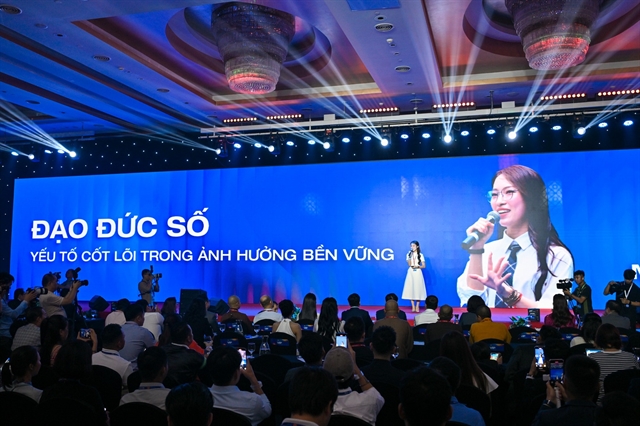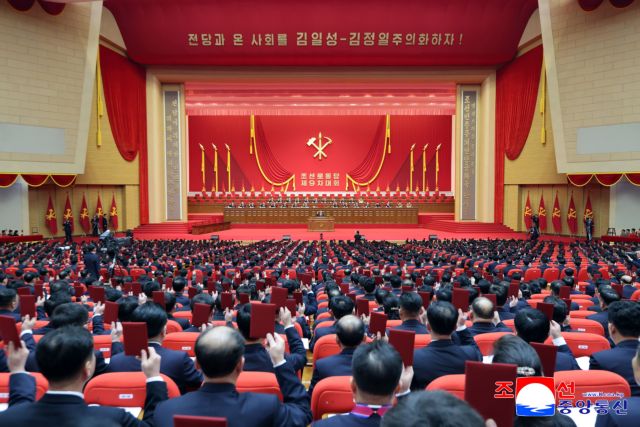 Society
Society

 |
| MC Khánh Vy, a popular KOL, speaks at the 'KOLs and the Era of Nation's Rise' conference held on August 28. VNA/VNS Photo Phạm Kiên |
In the digital era, key opinion leaders (KOLs) play an increasingly prominent role in shaping public opinion, driving social trends and promoting Vietnamese cultural values. Yet experts argue that a clear set of standards is needed to both harness their reach and ensure compliance with laws and ethical norms.
This will help pave the way for a cleaner and stronger online environment.
In Việt Nam, many KOLs on digital platforms boast hundreds of thousands and even millions of followers with high engagement rates. Their reputation allows them to spread positive values and inspire communities.
Rapper Đen Vâu is one such figure. Beyond his musical success, he is known for meaningful charitable work. He dedicated all proceeds of his YouTube song Nấu Ăn Cho Em (Cooking for You) to the Nuôi Em (Nurturing Children) project, which supports school meals and classroom construction for children in remote areas. He has remained deeply involved in other philanthropic efforts as well.
Reflecting on his journey, Đen Vâu said he had become increasingly aware of the responsibility that comes with influence.
“Each click, every piece of content I share, I think carefully about the potential consequences, especially for young people who engage with technology so much and from such an early age,” he said.
Venerable Thích Thánh Trí, head of the Information and Communications Committee of the Buddhist Sangha in Thái Nguyên Province, emphasised both the promise and the risks of social media.
“Information reaches audiences directly,” he said. “Alongside positive impacts there are negative ones. Monks, nuns and followers must also be mindful of legal regulations.”
Cybersecurity expert Ngô Minh Hiếu, founder of the Anti-scam project, highlighted the importance of collaboration.
“When KOLs join mainstream media in raising awareness about scams, the message becomes more credible and effective. Useful information, when amplified by influencers, can strengthen patriotism and bring real value to youth. This makes their social responsibility ever greater.”
That sense of responsibility underpins the newly launched Trusted Influencer programme, which has drawn wide interest from KOLs on August 18. It sets out five key criteria: transparency in content and advertising; ethical standards and communication history; genuine engagement and community feedback; alignment with brand and social values; and compliance with the law.
The programme is expected to serve as an important tool for the public, businesses and digital platforms to identify and collaborate with individuals who truly spread positive trustworthy messages.
In the long term, Trusted Influencer is envisioned as a vital filter that will guide online values, fostering a generation of responsible transparent KOLs who can act as 'ambassadors of digital trust' for society.
 |
| Singer Đen Vâu with children in a northern mountainous region. Photo courtesy of the Organising Committee of the 2023 National Volunteer Awards |
Đen Vâu welcomed the creation of the broader Digital Trust Alliance – a coalition uniting respected KOLs, key opinion consumers (KOCs), businesses, media outlets and platforms to spread positive values and foster trust – noting that clearer regulations and guidance from authorities will encourage content creators to act with greater accountability.
“As a public figure, I feel I must continually improve myself, act responsibly and spread positive values,” he said.
Joining hands for a safer cyberspace
Miss Intercontinental 2022 Lê Nguyễn Bảo Ngọc believes that the true value of a KOL does not lie in interaction metrics or appearance but in the ability to spread goodness, inspire others and make tangible contributions to the community.
As the line between 'real' and 'virtual' grows increasingly blurred, she stressed that prominent figures such as beauty queens, artists and young celebrities must remain steadfast in pursuing authentic sustainable values.
“True beauty comes from actions, dedication and positive influence. That is the foundation for building lasting credibility and value,” Ngọc said.
According to Nguyễn Thị Thanh Huyền, deputy director of the Authority of Broadcasting, Television and Electronic Information under the culture ministry, Việt Nam currently lacks specific legal regulations for managing influencers.
“Many KOLs have violated laws, ethics and cultural norms. Therefore, stricter mechanisms are needed, including disciplinary measures such as limiting their ability to perform or appear in the media,” she said.
She said that clear rules were required to define what content celebrities could and could not freely create.
“The ministry may develop regulations restricting appearances of those who commit violations. However, implementation will take time, requiring awareness campaigns, guidelines and coordination among relevant ministries and agencies,” Huyền added.
Internationally, approaches differ. In China, influencer management is seen as central to cultural and ideological governance, with violators facing harsh penalties ranging from fines to imprisonment or even permanent bans.
In South Korea, meanwhile, celebrities risk losing their fan base if they breach laws or ethical standards, as audiences regard idols as role models.
According to Huyền, Việt Nam should also leverage influencers to promote policy communication, create positive digital content and preserve cultural identity. This will turn KOLs into 'cultural ambassadors' who showcase Vietnamese values to the world.
From an economic perspective, Hoàng Ninh, deputy director of the E-commerce and Digital Economy Department under the Ministry of Industry and Trade, noted that influencers had made significant contributions to the growth of e-commerce. However, he warned that some had exploited their reputation to sell counterfeit or poor-quality goods or spread misleading information, harming businesses, brands and public trust.
CEO of TikTok Vietnam Nguyễn Lâm Thanh said that social media had transformed many people 'from zero to hero'. He argued that it was time for Việt Nam to adopt standardised criteria for evaluating influencers to both harness their reach and ensure compliance with legal and ethical standards, thereby fostering a cleaner stronger digital space.
Lt Gen Lê Xuân Minh, director of the Department of Cybersecurity and High-Tech Crime Prevention under the Ministry of Public Security, underscored the strategic role of influencers in the digital era.
“As national borders now extend to every internet access point, online influencers have become a special force that helps shape social perceptions, set trends, drive creativity and promote Vietnamese identity and values to the world. But with greater influence comes greater responsibility. Each influencer must be acutely aware of the impact of their words, images and actions,” he said.
In this context, the Trusted Influencer programme is designed to provide a comprehensive and verifiable evaluation framework to assess transparency, ethics and accountability. By doing so, it aims to establish communication standards consistent with the law, protect consumer rights and build trust among stakeholders. VNS

.jpg)


